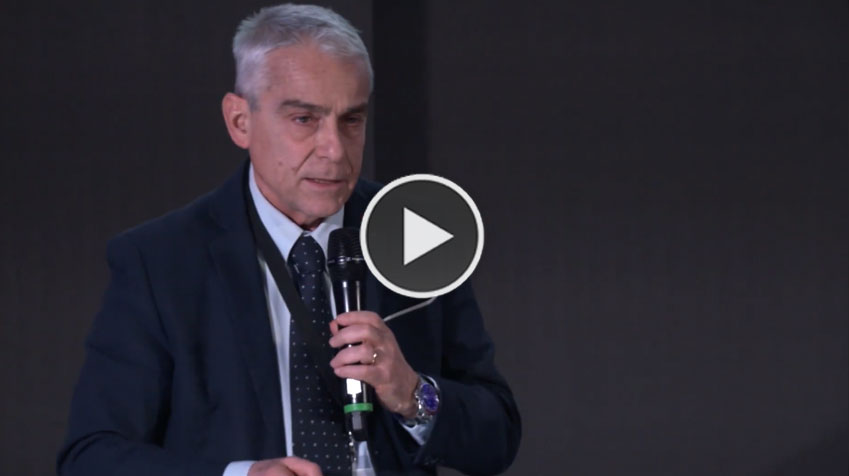Saturday, March the 24th, 3.30 pm
“WATER AS NUTRIENT. Water as Food for Health and Sports”
Water is the “quintessential” food for life (Sawka M. N, Samuel N. Cheuvront SN), and as Food it is certainly the most important food and/or macronutrient: Throughout scientific literature Water is defined as a nutritious and essential food, essential in that it is absolutely necessary both from a nutritional and biological point of view. Water is indispensable for all living beings; without Water there is no life, and in the human body Water is essential for the maintenance of chemical equilibria, for metabolic reactions and for the maintenance of basic physiological functions. As the main component of blood, it is a circulating volume that distributes nutrients to the rest of the body and helps the body to eliminate waste substances. Water is also important for regulating body temperature, either by distributing heat to peripheral tissues or by cooling the body through sweating. The body consists mainly of water, albeit with moderate variations according to various age groups: In adult men and women it represents 55-60% of body weight respectively, whilst muscles and the brain are made up of about 75 % water, blood and kidney are 81% water, the liver is about 70% water and bone and fat contain about 20%. Water also plays a fundamental role in the health and maintenance of a balanced physiological stability of muscle tissue, skin and, consequently, hair. Water also effects gastric secretions, in particular with respect to its Ph and its content in alkalizing minerals. A shortage of the Nutrient of Water is not tolerated beyond a certain limit and a certain duration of time: The body’s hydration and balance between the intake and exit of water depend on delicate homeostatic control by mechanisms that promptly modify the volumes of the circulating and cellular fluids, regulating the intake or excretion of other liquids and intervening in the regulation system in a highly efficient manner but with limited margins for compensation.
Dehydration and over-hydration lead to very serious consequences, not only from a health point of view, but also with regard to both acute and chronic survival. Indeed, the body needs water to survive and function properly. Human beings cannot live without drinking for more than a couple of days, as water needs are conditioned by many factors often related to each other, unlike other nutrients that can be absent for weeks or months. Water is at the base of the Food Pyramid of the Mediterranean Diet. Water is a fundamental nutrient in sport at any level, whether it be amateur, semi-professional or professional. Correct intake of water permits the athlete to attain full performance and to not drop in performance due to the reduction of body mass as a result of dehydration, especially if the sport is practiced in a warm and humid environment. During endurance exercise, 75% of energy is produced in the form of heat and the remainder in the form of movement. As the intensity of exertion increases, so does heat. As sweating is the principal mechanism of heat dispersion, athletes must drink fluids. Athletes who run in conditions of high temperature and humidity expose themselves to the risk of collapse at the end of the race due to the abrupt reduction of the return of blood to the heart with the cessation of muscle contraction, but also due to the reduction of circulating volumes as a result of liquid loss through sweating. Also, the type of water ingested before, during and after competition influences the athlete’s performance and health.
Water is the traditional drink to combat thirst and replenish lost fluids. According to its mineral content, mineral water may be categorised amongst the following types of water:
Oligomineral: between 50 and 500mg/L of solid residue,
Mineral: between 500 and 1500mg/L of solid residue,
Minimally mineralized: less than 50mg/L of solid residue,
Hyper-mineralized: more than 1500mg/L of solid residue.
It is evident that, given the significant loss of electrolytes through sweating, water that is poor in solutes is not recommended for athletes, whilst mineral water with a moderate solute content is suitable for the correction and replenishment of losses due to profuse sweating. Water losses between 0.2 and 0.5% of body mass can be replenished between 8 and 24 hours. On the other hand, losses of a higher percentage must be replenished immediately and with greater speed, so to safeguard the acute and chronic health of the kidneys.
Spedali Civili di Brescia
Graduated in Medicine and Surgery in 1976, he specialized in Endocrinology in 1979 at the University of Padua and in 1986 in Internal Medicine at the University of Parma. From 1980 he was Medical Assistant and then assistant joint head of the Division of Internal Medicine/Clinical Medicine of the University of Brescia-Spedali Civili of Brescia until 2016. In 1998 he was head of the Obesity Diagnosis and Therapy Center, and from 2004 to today, head of the Dietetics and Clinical Nutrition Unit – Department of Medicine, of the Spedali Civili of Brescia, overseeing 5 hospitals (Spedali Civili, Hospital of Gardone Val Trompia, Hospital of Montichiari, Children’s Hospital, Psychiatric Hospital). Lecturing Member of the Ethical Committee of the Spedali Civili from 2000 to 2011 and, from 2012 to date, Member of Reference for Dietetics and Clinical Nutrition.
From 1990 to date he is Adjunct Professor of the University of Brescia (School of Specialisation in Internal Medicine, School of Specialization in Endocrinology, Degree Course for Dental Hygienists, Degree Course in Dietetics, Degree Course in Healthcare). Member of ADI (ADI – Association of Dietetics and Italian Clinical Nutrition), from 2011 to 2015 he was President of ADI Lombardia, and from 2016 to date he is a Member of the National Board of Directors of ADI. Speaker and trainer in Congresses and Courses at a national level, he has published numerous articles in the field of endocrinology, Dietetics and Clinical Nutrition.

